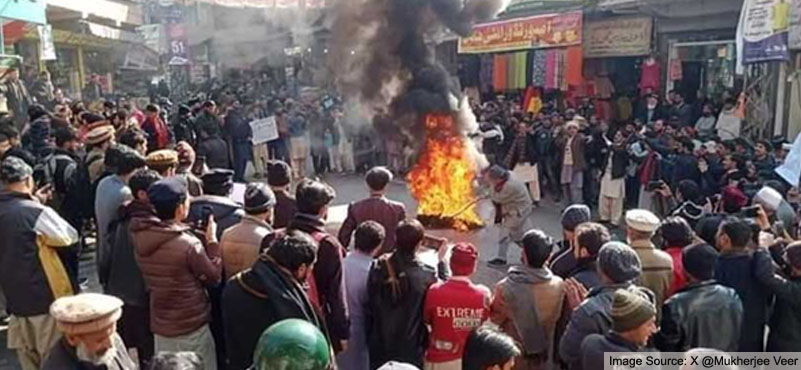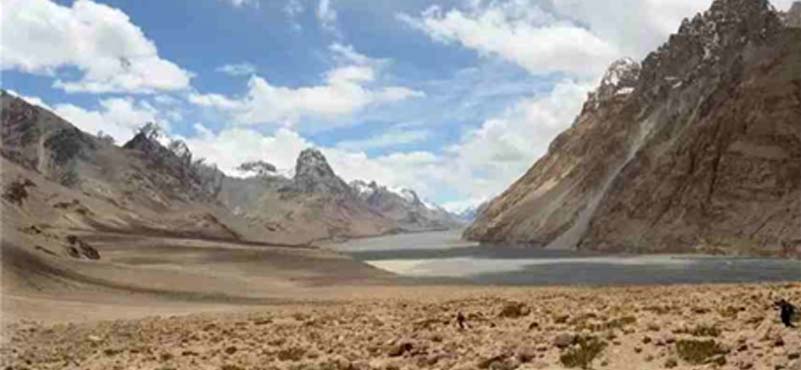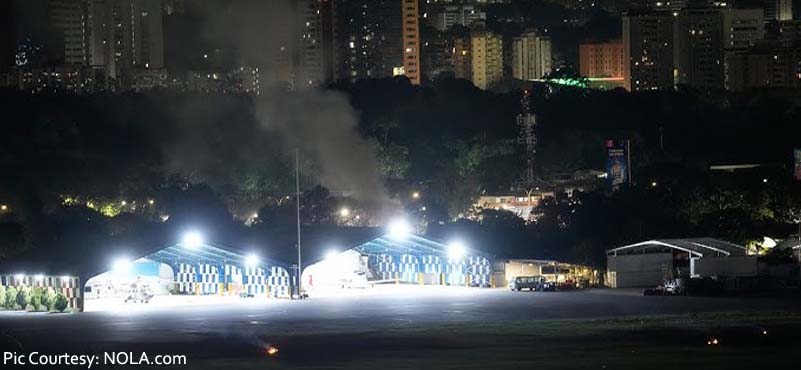The high altitude mountains of Gilgit-Baltistan conceal a violence that rarely reaches beyond Pakistan’s borders. Beneath the beauty lies a region crushed between military control, economic extraction, and political invisibility. This is Pakistan’s occupied silence, a land that votes but has no voice, a people who breathe but are denied personhood.
For Beijing, it’s a lifeline, the narrow bridge linking Xinjiang to the Arabian Sea. But for the people who actually live there, it’s become a prison without walls. In this forgotten corner of the world, activists vanish, voices are crushed, and natural wealth is looted in the name of “development.”
A Land Denied Identity
Since 1947, Gilgit-Baltistan has remained suspended, neither a province nor a free territory. Islamabad calls it “administered”, not owned; yet controls its land, law, and life. This legal ambiguity has become a convenient cage. It allows Pakistan to project sovereignty while denying constitutional rights. Decades after accession debates faded elsewhere, the people here are still treated as colonial subjects under a modern flag.
Islamabad governs GB through colonial reflexes. The so-called “Self-Governance Order” of 2009 gave the illusion of autonomy while keeping all meaningful power in federal hands. Land allocation, minerals, and foreign investment remain under the direct control of the Pakistani state and its agencies. Elections come and go, but real decisions are taken in Rawalpindi’s cantonment or Beijing’s boardrooms.
The Fourth Schedule — Death Beyond Death
What Britain left behind as colonial law, Pakistan weaponised into control. The Fourth Schedule, intended for terrorists, has been turned on teachers, writers, and youth leaders. Activists Javed Qureshi and Yawar Abbas were assassinated for questioning the state’s looting of local resources. Even in death, they were not spared; both were listed posthumously under the Fourth Schedule. Their names became case numbers, their voices state property. It is a perverse bureaucracy, one that kills dissent, then criminalises the memory of the dead.
The Looting of the Mountains
Gilgit-Baltistan is mineral-rich, with the advantage of rivers and forests. Yet that wealth has never belonged to its people. Hydropower projects drain valleys; mining contracts vanish into Islamabad’s ministries; roads meant for “development” lead only to military cantonments. The locals call it resource colonialism. They see their forests felled, their rivers diverted, their mountains leased to corporations with army links. “Green tourism”, the new slogan, is little more than camouflage for extraction under military watch.
The Age of Fear
Sectarian and ethnic manipulation has been used as a tool of control. Since the 1980s, sectarian attacks like the 1988 Gilgit massacre that wiped out hundreds of Shia villagers have never truly stopped. Instead of protection, the state has often looked away, or worse, fanned the divisions. It is divide and rule, updated for the 21st century.
In the last decade, repression has turned routine. Enforced disappearances, arbitrary arrests, and fake cases mark the daily landscape. Javed Naji’s killing in Tangir, an outspoken advocate for displaced families, was followed by silence from Islamabad. His children continue to protest, holding their father’s photo in rallies guarded by armed police. Their demand is simple: justice. The response is predictable: nothing.
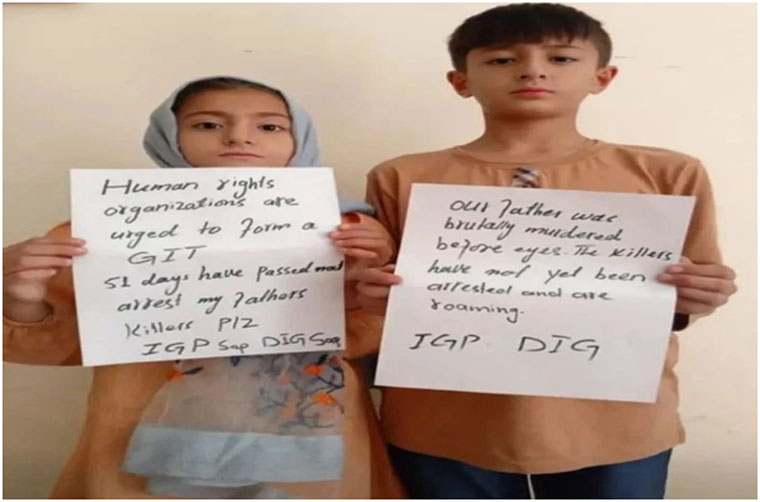
Others like Baba Jan, Manzoor Parwana, and Shabbir Mayar have been jailed on fabricated charges. Human rights workers vanish into the system, resurfacing months later in “terror cases”. Media outlets publish censored lines; journalists whisper truth only in private. The government calls it “security management”. On the ground, it is the slow annihilation of civil life.
The Chinese Shadow
China’s presence looms large over everything. Officially, Beijing calls CPEC a “win-win partnership.” But for GB, it’s more like a takeover in slow motion. Chinese state-owned firms have been granted mining and infrastructure contracts with zero local consultation. Land that has belonged to communities for generations is being fenced off in the name of “strategic projects.”
Security for these projects has brought a heavy militarisation of the region. Locals talk about check-posts every few kilometres, surveillance drones, and restricted movement near Chinese camps. The priority is not people’s safety, it’s protecting Chinese investments.
Beijing’s approach is transactional: stability at any cost. It wants the corridor to function, the roads to stay open, and dissent to stay buried. For Islamabad, this partnership is perfect: Chinese money, Pakistani control, and no questions asked about human rights. The result is a quiet, high-altitude occupation: by the gun and by the contract.
The Silence of the Global Order
The world’s indifference has made this easier. The United Nations’ mechanisms move slowly, and major human rights bodies issue statements that vanish in diplomatic noise. Western capitals, preoccupied with trade and counterterrorism deals, prefer not to question Islamabad or Beijing. The result is impunity disguised as sovereignty.
Gilgit-Baltistan’s tragedy sits at the intersection of human rights and geopolitics, and in both, it is expendable.
Prognosis: The Coming Reckoning
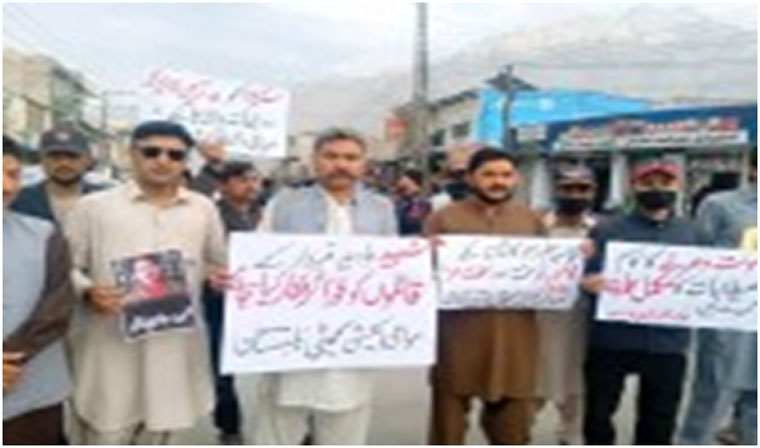
Repression can delay unrest, not erase it. Gilgit-Baltistan’s youth are no longer isolated by mountains or censorship. They know the vocabulary of rights and the geography of power. They’ve seen how their rivers are auctioned, how their leaders are killed and then defamed. The events in Skardu and Hunza are no longer isolated; they’re ripples of a larger awakening. Even the army’s old tools, sectarian manipulation and fear are losing their grip among the new generation of educated youth.
Long-term stability in Gilgit-Baltistan cannot come from the barrel of a gun or the shadow of a Chinese contract. It can only come from rights, representation, and respect. Pakistan must end the Fourth Schedule’s abuse, investigate extrajudicial killings, and let GB’s people decide how their land and resources are used. And the world must stop pretending this is an internal matter. Silence is complicity.
Aspirations from India
Across Gilgit-Baltistan, beneath the enforced silence, runs a quiet current of remembrance and hope. Many still recall that in 1947, their forebears fought alongside the Dogra forces, raised the Indian flag, and sought rightful accession to the Indian Union; a historical truth Pakistan’s narrative buries. Decades of denial have only deepened the contrast between coercion and consent. For many in GB, India represents what Pakistan never offered: lawful identity, constitutional protection, and the dignity of citizenship. This sentiment is not driven by propaganda but by lived experience. In India, they see a functioning democracy; in Pakistan, a state that rules without representation. The young speak of freedom, not secession, of wanting to be part of a system where the law protects rather than punishes. Their quiet glances southward are not acts of defiance but reminders that justice and belonging still have a home across the Line of Control.
The Verdict
The names of Javed Qureshi, Yawar Abbas, and Javed Naji will not fade. Their struggle embodies a truth the state cannot erase: that justice delayed is not forgotten, only deferred until the next generation demands it louder.
In Skardu’s cold winds, their families still light candles under military watch. The state fears these small flames more than slogans. Because each flame remembers what the constitution forgot, that Gilgit-Baltistan is not Pakistan’s property. It is a stolen homeland waiting for its voice back. People who look upon India more than Pakistan.
The world must listen before another soul joins the Fourth Schedule.
ABOUT THE AUTHOR
 Lieutenant General A B Shivane, is the former Strike Corps Commander and Director General of Mechanised Forces. As a scholar warrior, he has authored over 200 publications on national security and matters defence, besides four books and is an internationally renowned keynote speaker. The General was a Consultant to the Ministry of Defence (Ordnance Factory Board) post-superannuation. He was the Distinguished Fellow and held COAS Chair of Excellence at the Centre for Land Warfare Studies 2021 2022. He is also the Senior Advisor Board Member to several organisations and Think Tanks.
Lieutenant General A B Shivane, is the former Strike Corps Commander and Director General of Mechanised Forces. As a scholar warrior, he has authored over 200 publications on national security and matters defence, besides four books and is an internationally renowned keynote speaker. The General was a Consultant to the Ministry of Defence (Ordnance Factory Board) post-superannuation. He was the Distinguished Fellow and held COAS Chair of Excellence at the Centre for Land Warfare Studies 2021 2022. He is also the Senior Advisor Board Member to several organisations and Think Tanks.

